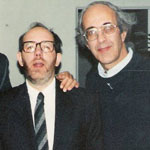A guest essay by Beth Kawasaki. Beth earned her Masters of Arts in Theology from Fuller Theological Seminary and works on behalf of at risk women and children in developing communities and countries. She lives with her family in Northern California.
For Sunday October 18, 2015
Lectionary Readings (Revised Common Lectionary, Year B)
Job 38:1–7, (34–41) or Isaiah 53:4–12
Psalm 104:1–9, 24, 35c or Psalm 91:9–16
Hebrews 5:1–10
Mark 10:35–45
On the last day of my term as the president of my kid’s PTA, a committee chair said that she had enjoyed working with me because I wasn’t “all-Type A,” and that I was a “Type B kind of leader.” I must have blanched, because she then made a heroic effort to explain why this was a compliment.
She did a great job, but my initial gut reaction to being called Type B was negative. Even worse, it revealed that I had internalized a definition of leadership that I don’t practice (apparently) nor aspire to (I think), but which is nonetheless subconsciously present and powerful.
Last month we witnessed lots of leaders in the media: Pope Francis visiting Cuba and the U.S., John Boehner resigning as the Speaker of the House, and GOP candidates info-taining us with their debates. Recognizing that there is value in their diversities of experiences, styles, worldviews, and roles, I found myself yearning for a transcendent common core that unites and underpins human efforts as we consider the urgent issues of our day.
 |
|
Henri Nouwen and Bill Van Buren.
|
C.S. Lewis argued for this unifying idea in what he called “Tao” in his book The Abolition of Man. Lewis’s Tao is a belief that humans have an objective, shared sense of what attitudes and actions ring more true vs. more false, and that this shared sense has spanned human history, cultures, and religions.
But even with Tao-fueled hope, this week’s lectionary readings are unsettling reminders of the costly and ephemeral nature of authentic leadership. In Job, God casts creation as big, beautiful, and fierce, and points out that humans are not the creators or center of it.
In Isaiah, Psalm 104, and Mark, the authors caution that being just does not necessarily mean that one will be safe, unopposed, and understood. In Hebrews, even good leaders are tempted and fail, and must access the forgiveness they promote and provide for others. These scriptures affirm that God is in control, with us, and for us, but also that God is not a spin doctor or a fixer.
My favorite book on leadership is Henri Nouwen’s In the Name of Jesus. And like the lectionary, it speaks to the costly and paradoxical nature of Christian leadership. Nouwen, a Dutch-born Catholic priest, professor and writer, had reached the highest level of success and influence as a religious academic: teaching at the University of Notre Dame, and then Yale and Harvard Divinity Schools. He later left academia to live in L’Arche Daybreak community with profoundly developmentally-disabled adults. His experience as pastor there broke open his definitions of success and leadership and led to this small book.
Two Gospel stories guide Nouwen’s three-part reflection: the story of Jesus’ temptation in the desert (Matthew 4:1-11) and the story of Peter’s call to be a shepherd (John 21:15-19). Nouwen writes, “Jesus’s first temptation was to be relevant: to turn stones into bread.” He then challenges our drive for control, efficiency, and relevance: “While efficiency and control are great aspirations of our society, the loneliness, broken relationships, boredom, feelings of emptiness and depression, and a deep sense of uselessness fill the hearts of millions of people in our success-oriented world.”
Instead, he proposes that future leaders will be those who dare to “claim their irrelevance” and enter into solidarity with the suffering majority, bringing the light of Jesus to them as one of them.
Is Nouwen kidding? How do we dare do this?
Yet, Jesus did not ask Peter, his successor, “Who is going to take you seriously?” “What are your metrics?” or “When will you deliver some results?” Instead, Jesus asks, “Do you love me?”
The source for our guidance and courage, Nouwen says, is contemplative prayer. For a fruitful future as a Christian leader, regardless of setting, we must move beyond ego and importance, and “from the moral to the mystical,” and root ourselves in an intimate relationship with Jesus.
Jesus’s second temptation was to do something spectacular, something worthy of hits, likes, tweets, and more followers. The Devil goads Jesus at the top of the Temple, “Since you are God’s Son, jump... They (angels) will catch you so that you won’t so much as stub your toe on a stone.” (The Message)
With best sellers like Lean In, the proliferation of TED talks, and hours of reality TV, personal branding is the new norm. It’s hard to feel “in” if you’re not pursuing audience and applause. But Nouwen writes, “Jesus didn’t come to be a stunt man,” and Jesus makes it clear to Peter that his promotion is not for him alone.
This is a new kind of leadership modeled on the servant-leader Jesus rather than power games. Peter will be a shepherd who, night and day, nourishes, gathers, rescues, restores, and needs the community as much as it needs him.
 |
|
Pope Francis.
|
Sadly, followers often deny their leaders a safe space for emotion, confession, and forgiveness when they fail. Social media enables and encourages people to judge others with little repercussion. It’s Lord of the Flies out there.
But healthy two-way relationships and safety are what leaders need from their communities, says Nouwen, so they can “overcome the temptation of individual heroism” through the discipline of confession and forgiveness.
Nouwen concludes with Jesus’s last temptation — the temptation of power. He observes that “one of the greatest ironies of the history of Christianity is that its leaders constantly gave in to the temptation of power” — political, military, economic, or moral and spiritual —“even though they continued to speak in the name of Jesus, who did not cling to his divine power but emptied himself and became as we are.”
Maybe it’s because “it seems easier to be God than to love God, easier to control people than to love people, easier to own life than to love life,” observes Nouwen.
Jesus finally shares a last word on mature leadership with Peter before commanding him to “follow me.” He tells Peter that he must be willing to be led where he would rather not go, to a place where power is abandoned in favor of love, and a space where a leader can critically discern where God is leading.
A seminary professor once commented that Nouwen’s teachings wouldn’t fly in most settings today, even in churches, because contemplative prayer, confession, and critical discernment take too much time.
But then there's Pope Francis, who told the American Congress, “Let us treat others with the same passion and compassion with which we want to be treated. Let us seek for others the same possibilities which we seek for ourselves. Let us help others to grow, as we would like to be helped ourselves. In a word, if we want security, let us give security; if we want life, let us give life; if we want opportunities, let us provide opportunities. The yardstick we use for others will be the yardstick which time will use for us.”
Image credits: (1) L'Arche Daybreak and (2) University of Notre Dame — Oblation: Liturgy and Life.





